A chromatin-mediated reversible drug-tolerant state in cancer cell subpopulations
- PMID: 20371346
- PMCID: PMC2851638
- DOI: 10.1016/j.cell.2010.02.027
A chromatin-mediated reversible drug-tolerant state in cancer cell subpopulations
Abstract
Accumulating evidence implicates heterogeneity within cancer cell populations in the response to stressful exposures, including drug treatments. While modeling the acute response to various anticancer agents in drug-sensitive human tumor cell lines, we consistently detected a small subpopulation of reversibly "drug-tolerant" cells. These cells demonstrate >100-fold reduced drug sensitivity and maintain viability via engagement of IGF-1 receptor signaling and an altered chromatin state that requires the histone demethylase RBP2/KDM5A/Jarid1A. This drug-tolerant phenotype is transiently acquired and relinquished at low frequency by individual cells within the population, implicating the dynamic regulation of phenotypic heterogeneity in drug tolerance. The drug-tolerant subpopulation can be selectively ablated by treatment with IGF-1 receptor inhibitors or chromatin-modifying agents, potentially yielding a therapeutic opportunity. Together, these findings suggest that cancer cell populations employ a dynamic survival strategy in which individual cells transiently assume a reversibly drug-tolerant state to protect the population from eradication by potentially lethal exposures.
Copyright 2010 Elsevier Inc. All rights reserved.
Figures
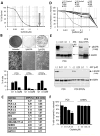
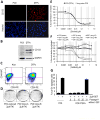
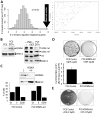
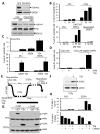
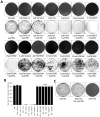

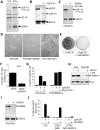
Comment in
-
Drugging drug resistance.Cell. 2010 Apr 2;141(1):18-20. doi: 10.1016/j.cell.2010.03.020. Cell. 2010. PMID: 20371339
References
-
- Balaban NQ, Merrin J, Chait R, Kowalik L, Leibler S. Bacterial persistence as a phenotypic switch. Science. 2004;305:1622–1625. - PubMed
-
- Bolden JE, Peart MJ, Johnstone RW. Anticancer activities of histone deacetylase inhibitors. Nat Rev Drug Discov. 2006;5:769–784. - PubMed
-
- Buck E, Eyzaguirre A, Rosenfeld-Franklin M, Thomson S, Mulvihill M, Barr S, Brown E, O’Connor M, Yao Y, Pachter J, et al. Feedback mechanisms promote cooperativity for small molecule inhibitors of epidermal and insulin-like growth factor receptors. Cancer Res. 2008;68:8322–8332. - PubMed
Publication types
MeSH terms
Substances
Grants and funding
LinkOut - more resources
Full Text Sources
Other Literature Sources
Medical
Miscellaneous

